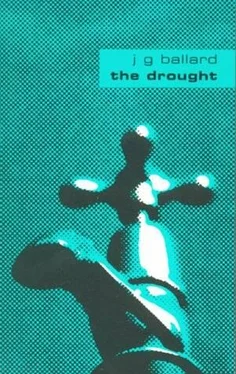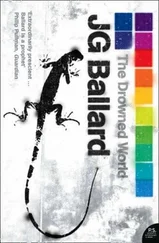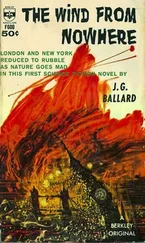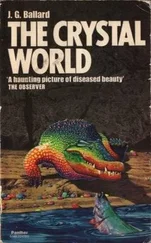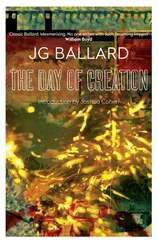As he entered the dell, Mrs. Quilter was sitting in the doorway of her booth, darning an old shawl. At the sound of footsteps she put away her needle and closed the lower half of the painted door, then kicked it open again when she identified Ransom. In the ten years among the dunes she had barely aged. If anything her beaked face was softer, giving her the expression of a quaint and amiable owl. Her small round body was swathed in layers of colored fabrics stitched together from the oddments salvaged by the quarry workers- squares of tartan blanket, black velvet, and faded corduroy, ruffed with strips of embroidered damask.
Beside her, outside the door, was a large jar of fish-oil. A dozen herrings, part of her recent take, dried in the sun. On the slopes around her, lines of shells and conches had been laid out in the sand to form a series of pentacles and crescents.
Dusting the sand off the shells as Ransom approached was Catherine Austen. She looked up, greeting him with a nod. Despite the warm sunlight in the hollow, she had turned up the leather collar of her fleece-lined jacket, hiding her lined face. Her self-immersed eyes reminded Ransom of the first hard years she had spent with the old woman, eking out their existence among the shells of the old motorcars. The success of their present relationship-their fading red hair made them seem like mother and daughter-was based on their absolute dependence on each other and the rigorous exclusion of everyone else.
On the sloping sand Catherine had set out the signs of the zodiac, the dotted lines outlining the crab, ram, and scorpion.
"That looks professional," Ransom commented. "What's my horoscope for the day?"
"When were you born? Which month?"
"Cathy!" Mrs. Quilter waved her little fist at Ransom from her booth. "That'll be a herring, doctor. Don't give him charity, dear."
Catherine nodded at the old woman, then turned to Ransom with a faint smile. Her strong, darkly tanned face was hardened by the spray and wind. "Which month? Don't tell me you've forgotten?"
"June," Ransom said. "Aquarius, I assume."
"Cancer," Catherine corrected. "The sign of the crab, doctor, the sign of deserts. I wish I'd known."
"Fair enough," Ransom said. They walked past the merrygo-round. He raised his hand to one of the horses and touched its eyes. "Deserts? Yes, I'll take the rest as read."
"But which desert, doctor? There's a question for you."
Ransom shrugged. "Does it matter? It seems we have a knack of turning everything we touch into sand and dust. We've even sown the sea with its own salt."
"That's a despairing view, doctor. I hope you give your patients a better prognosis."
Ransom looked down into her keen eyes. As she well knew, he had no patients. During the early years at the beach he had tended htindreds of sick and wounded, but almost all of them had died, from exposure and malnutrition, and by now he was regarded as a pariah by the people of the settlement, on the principle that a person who needed a doctor would soon die.
"I haven't got any patients," he said quietly. "They refuse to let me treat them. Perhaps they prefer your brand of reassurance." He looked around at the hills above. "For a doctor there's no greater failure. Have you seen Philip Jordan? About half an hour ago?"
"He went by. I've no idea where."
For half an hour Ransom climbed the dunes, wandering, in and out of the foothills below the cliffs. Old caves studded the base, crude glass windows and tin doors let into their mouths, but the dwellings had been abandoned for years. The sand retained something of the sun's warmth, and for ten minutes Ransom lay down and played with the tags of wastepaper caught in its surface. Behind him the slopes rose to a smooth bluff a hundred feet above the dunes, the small headland jutting out over the surrounding hills. Slowly Ransom climbed up its flank, hoping that from here he would see Philip Jordan when he returned to the settlement.
Reaching the perch, he sat down and scanned the beach below. In the distance lay the shore, the endless banks of salt undulating out toward the sea. The wrecked freighters in the settlement were grouped together like ships in a small port. Ignoring them, Ransom looked out over the wide bed of the river. For more than half a mile it was overrun by dunes and rockslides. Gradually the surface cleared to form a hard white deck, scattered with stones and small rocks, the dust blown between the clumps of dried grass.
Exploring the line of the bank, Ransom noticed that a small valley led off among the rocks and ravines. Like the river, the valley was filled with sand and dust, the isolated walls of ruined houses built on the slopes half-covered by the dunes.
In the slanting light Ransom could clearly see the line of footprints newly cut in the powdery flank. They led straight up to the ruins of a large villa, crossing the edge of a partly excavated road around the valley.
As Ransom made his way down from the bluff he saw Philip Jordan emerge briefly behind a wall, then disappear down a flight of steps.
Five minutes later, as Ransom climbed the slope to what he guessed was the old Negro's secret grave, a rock hurtled through the air past his head. He crouched down and watched the rock, the size of a fist, bound away off the sand.
"Philip!" he shouted into the sunlight. "It's Ransom!"
Philip Jordan's narrow face appeared at the edge of the road. "Go away, Ransom," he called brusquely. "Get back to the beach." He picked up a second stone. "I've already let you off once today."
Ransom held his footing in the shifting sand. He pointed to the ruined villa. "Philip, don't forget who brought him here. But for me he wouldn't be buried at all."
Philip Jordan stepped forward to the edge of the road. Holding the rock loosely in one hand, he watched Ransom begin the climb up to him. He raised the rock above his head. "Ransom…!" he called warningly.
Ransom stopped again. Despite Philip Jordan's advantages in strength and years, Ransom found himself seizing at this final confrontation. As he edged up the slope, remembering the knife hidden in his right boot, he knew that Philip Jordan was at last repaying him for all the, help Ransom had given to the river-borne waif fifteen years earlier. No one could incur such an obligation without settling it to the full one day in its reverse coin. But above all, perhaps, Philip saw in Ransom's ascetic face a likeness of his true father, the wandering fisher-captain who had called to him from the riverbank and from whom he had run away for the second time.
Slowly, Ransom climbed upwards, feeling with his feet for spurs of buried rock. His eyes watched the stone in Philip's hand, shining in the sunlight against the open sky.
Standing on a ledge twenty feet above the road, apparently unaware of the scene below, was a thin, long-bodied animal with a ragged mane. Its gray skin was streaked white by the dust, the narrow flanks scarred by thorns, and for a moment Ransom failed to recognize it. Then he raised his hand and pointed, as the beast gazed out entranced at the distant sea and the wet saltflats.
"Philip," he whispered hoarsely. "There, on the ledge."
Philip Jordan glanced over his shoulder, then dropped to one knee and hurled the stone from his hand. As the piece burst into, a dozen fragments at its feet, the small lion leapt frantically to one side. With its tail down it' bolted away across the rocky slopes, legs carrying it in a blur of dust.
As Ransom clambered up onto the road he felt Philip's hand on his arm. The young man was still watching the lion as it raced along the dry riverbed. His hand was shaking, less with fear than some deep unrestrainable excitement.
"What's that-a white panther?" he asked thickly, his eyes following the distant plume of dust vanishing among the dunes.
Читать дальше
Конец ознакомительного отрывка
Купить книгу
